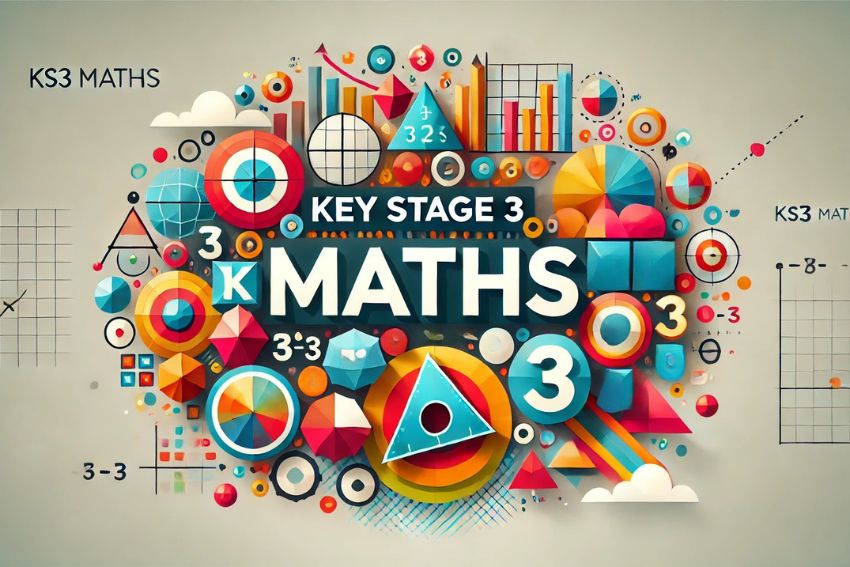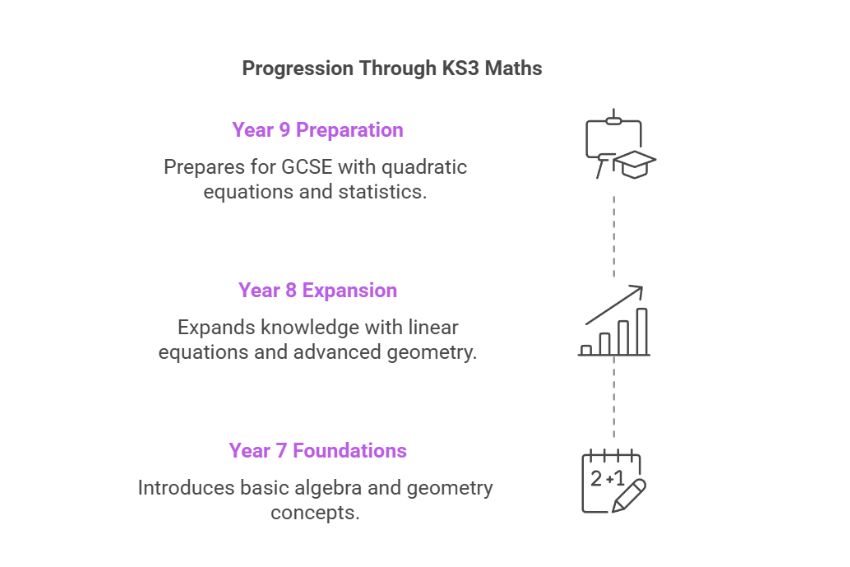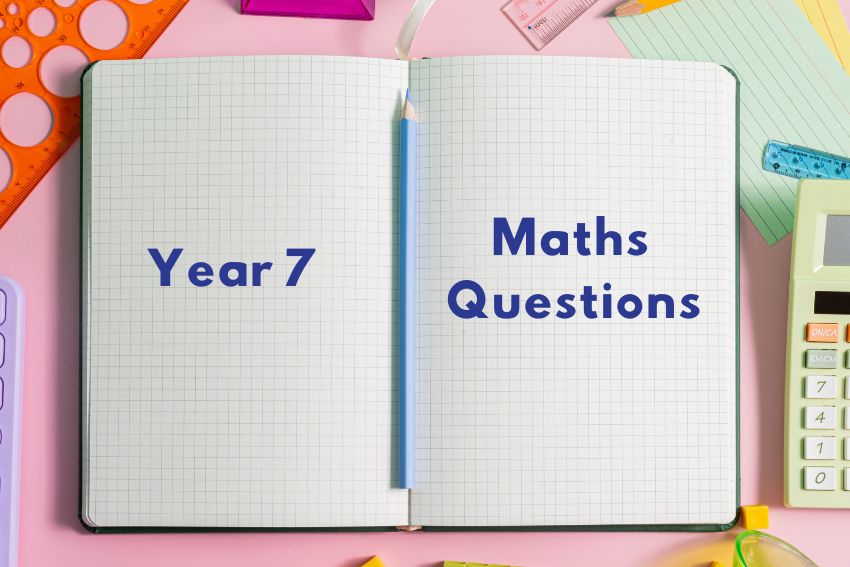KS3 Maths Made Easy: Learning Strategies and Revision Tips
KS3 Maths (Key Stage 3 Maths) is a crucial stepping stone in every student’s mathematical journey. Covering years 7, 8, and 9, this stage helps students build a strong foundation in essential maths topics like algebra, geometry, and statistics. The skills learned during this time not only prepare students for GCSEs but also enhance their problem-solving abilities in everyday life.
In this blog, we’ll explore the KS3 Maths curriculum, breaking down key topics and sharing tips for effective learning. Whether you’re a student looking to ace your maths revision or a parent wanting to understand Maths Education in the UK, this blog is for you. It is designed to make Key Stage 3 Maths approachable and engaging for everyone.

Key Stage 3 Maths Curriculum Explained
The KS3 Maths curriculum, aligned with the maths national curriculum, is designed to cover a variety of topics. It ensures students develop a comprehensive understanding of mathematics, forming the building blocks for advanced learning in later years.
Algebra: Students explore key concepts like simplifying expressions, solving equations, and understanding sequences. This area also introduces them to the basics of graphs and functions, setting the stage for more complex problems in the future.
Geometry: Geometry focuses on shapes, angles, and measurements. Students learn to calculate areas, perimeters, and volumes while gaining a deeper understanding of symmetry, transformations, and the properties of 2D and 3D shapes.
Statistics: This topic equips students with the skills to collect, analyze, and interpret data. Key subtopics include averages, probability, and representing data through graphs and charts.
KS3 Maths Topics Across Years 7, 8, and 9
Year 7 Maths Curriculum: Introduces fundamental concepts like basic algebra and geometry, building a solid mathematical base. Year 8 Maths Curriculum: Expands on these topics, delving deeper into areas like linear equations and more advanced geometry. Math Year 9: Prepares students for GCSE-level learning with a focus on more challenging topics, such as quadratic equations and detailed statistical analysis. Throughout these years, KS Maths topics are revisited and expanded, ensuring students have a clear understanding before progressing.

Effective Teaching Strategies to Master KS3 Maths
Learning KS3 Maths doesn’t have to be daunting—it’s all about the right teaching strategies. By using effective methods tailored to students’ needs, understanding even the trickiest maths topics can become manageable and enjoyable.
One proven approach is to make lessons interactive. Encouraging group discussions and hands-on activities can help students grasp challenging concepts like algebra or geometry. For example, using real-life examples when solving equations or measuring angles can make abstract ideas feel more relatable and practical.
Technology also plays a significant role in teaching KS3 Maths. Tools like online simulations, maths games, KS3 Maths tests and digital whiteboards bring learning to life, making it engaging for students. Platforms that offer KS3 maths worksheets and games allow students to practice in a fun and stress-free way.
Additionally, a mix of traditional teaching with modern tools helps cater to different learning styles, ensuring every student benefits.
Resources and Materials for KS3 Maths
When it comes to mastering KS3 Maths, having the right resources can make all the difference. There are many supplementary tools and materials that can enhance your KS3 Maths revision.
Recommended Textbooks: Classics like KS3 Maths Study Guide by CGP or Collins KS3 Maths Complete Practice Workbook are great for reinforcing concepts and providing ample practice problems. These are trusted by students and teachers alike for their clarity and comprehensive coverage.
Interactive Platforms: Websites such as BBC Bitesize offer free, high-quality KS3 Maths resources. They provide topic-based explanations, practice questions, and short quizzes, all designed to make learning enjoyable. Another excellent option is NRICH, which offers problem-solving activities to challenge and develop mathematical thinking.
KS3 Maths Worksheets: Printable Key stage 3 maths worksheets are a fantastic way to practice offline. Sites like Twinkl provide downloadable materials covering everything from algebra to geometry. These resources are especially helpful for parents supporting their child’s revision at home.

Assessment and Evaluation in Key Stage 3 Maths
Assessing progress is an essential part of mastering KS3 Maths. Regular evaluations help students identify their strengths and weaknesses. They also provide teachers and parents with valuable insights into the student’s learning journey.
KS3 Maths: Approaches to Assessment
- Formative Assessments: Short quizzes or in-class tasks are excellent tools to track ongoing progress. These help identify areas where students need extra support without the pressure of formal testing.
- Summative Assessments: End-of-term exams or mock tests gauge how well students have mastered key maths topics, such as algebra or statistics, within the KS3 Maths curriculum.
KS3 Maths: Marking Schemes
Clear marking schemes provide structured feedback, allowing students to see where they excelled and where they lost marks. For instance: Award 2 points for correctly isolating the variable in the algebra question above and 1 point for the correct answer.
Assessments are more effective when they are used as learning tools, helping students build confidence while addressing gaps in knowledge.
Challenges and Solutions in Maths KS3
Maths KS3 comes with challenges, but the right strategies help every student excel in their maths topics. Identifying common difficulties and tackling them head-on helps make the learning journey smoother and more rewarding.
Common Challenges Students Face in Maths KS3:
- Struggling with Abstract Concepts: Topics like algebra or probability can feel disconnected from real life, making them harder to understand.
- Retaining Knowledge Across Maths Topics: With the wide range of subjects covered in the KS3 Maths curriculum, students often struggle to recall earlier lessons
- Time Management During Tests: Completing questions across multiple maths topics under exam conditions can feel overwhelming.
- Low Confidence in Maths KS3: A fear of maths often affects performance and prevents students from engaging fully.
Strategies to Overcome These Challenges:
- Relating Maths Topics to Real Life: Connecting abstract concepts to everyday scenarios helps students understand and apply what they learn. For example, using geometry for home design or statistics to interpret sports data.
- Regular Revision of Maths KS3 Content: Incorporating KS3 maths worksheets and quick quizzes into weekly study routines can reinforce learning and boost memory.
- Timed Practice: Completing past papers under timed conditions helps students manage their pace during tests.
- Confidence Building: Start with easier maths topics to build the basis and gradually introduce more challenging problems. Positive reinforcement makes a big difference.
By focusing on these strategies, students can tackle any challenge in their maths KS3 journey and develop a strong foundation for future learning.
Conclusion
KS3 Maths, or Key Stage 3 Maths, is a vital step in education. It builds the foundation for advanced learning and practical problem-solving. We’ve covered essential maths topics like algebra, geometry, and statistics. These topics are structured across years 7, 8, and 9 to ensure gradual learning. Additionally, we’ve discussed effective teaching strategies, valuable resources, and tips for KS3 maths revision to help students succeed.
While mathematics is crucial, a well-rounded Key Stage 3 education also includes strong literacy skills. For parents looking to support their child’s complete academic development, our guide to KS3 English and KS3 Geography provides similar insights into curriculum expectations and learning strategies.
Whether you’re a student, parent, or educator, remember that consistent practice and revisiting key maths topics are crucial to mastering the KS3 Maths curriculum.
For those who feel they need extra support, online KS3 Maths tutors can provide personalized guidance tailored to individual learning needs. With the right resources and dedication, excelling in KS3 Maths is entirely achievable.
FAQs
What is KS3 Maths?
KS3 Maths, or Key Stage 3 Maths, refers to the mathematics curriculum taught in the UK to students in years 7, 8, and 9. It includes essential maths topics such as algebra, geometry, and statistics, laying the groundwork for GCSEs and advanced mathematical learning.
What grade level is Key Stage 3?
Key Stage 3 corresponds to years 7, 8, and 9 in the UK education system, typically covering students aged 11 to 14.
How can I prepare for KS3 Maths exams?
Preparing for KS3 Maths exams involves regular practice, using KS3 maths revision materials such as worksheets, past papers, and interactive online resources. Reviewing core maths topics and working through timed practice papers can boost confidence and performance.
What are the key maths topics in KS3 Maths?
The key maths topics in KS3 include algebra, geometry, and statistics, along with foundational concepts like arithmetic, probability, and data representation. These topics build essential skills for GCSE-level learning and real-life applications.
Are there resources for KS3 maths revision?
There are many resources available for KS3 maths revision, including free worksheets, online quizzes, and educational platforms like BBC Bitesize and NRICH.








